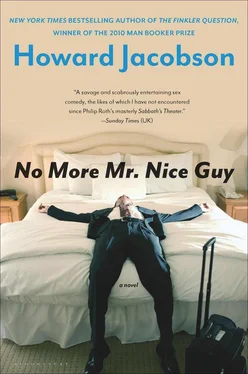She made him well. She taught him self-regard. She showed him how everything didn’t have to be a hurry or a hurt, how he could make a ceremony out of eating, ironing, sex. She even showed him how to take some small pleasures in the crap he watched all day on telly. OK, Oprah might not have been to his taste, but she addressed the feelings, didn’t she? And she was warm — that was called warmth, Frank. And sure, the conversation of those Cockneys who made all their important life-decisions in the pub wasn’t of the sort that Frank and Mel may have recognised as penetrating, but it gave pleasure to others, and where would the world be if it only contained the sort of people whose conversation Mel and Frank found penetrating? Besides, she explained, disliking everything he saw and did was making him ill. Bad heartedness was not just a figure of speech. Thinking and feeling badly actually made the heart bad. Weakened it. Predisposed it to disease. He would have a heart attack from attacking. When they cut him open they would see the scars made by all the intemperate attacks he’d launched on others and on himself. She calmed him; she soothed him; she talked to him as though he were an imbecile, she made him see that the universe was a plenteous place, roomy enough for diversity, and unlikely to run out of food and drink and girls, so Frank didn’t have to gobble it all up at once and make himself feel poorly afterwards. She couldn’t have succoured him better had she left him to guzzle on her tit.
It cost her in the end. Making someone else well always does. She expended so much energy on the reparation of his self-esteem that she had none left for the maintenance of her own. He was meant to do the same for her now. Massage her heart; talk to her as though she were an imbecile. But he couldn’t ever make the sentences sound right. ‘Get your finger out of your fucking throat!’ he yelled at her. ‘Is that meant to help me?’ she asked. ‘Is that your way of being calming?’ But what was he supposed to do? He was a man; he suffered from M.A.N.; and men don’t have tits.
Even when she’d given up on him and closed her ears against the noise he made, she kept him well by virtue of her brute presence. The mere fact of her being there — even if he didn’t touch her, even if he didn’t see her — was enough to stop him going whoring whenever the fancy took him. Whoever invented the idea of the stable relationship understood the necessity for anchorage. A cold line extended from Frank’s keel to the icy ocean bed of habituation. Friend or foe, Mel was there, a mooring, a tether, an ever-present weight that prevented him floating out into the uncertain immensity of the night.
Then he became fifty and no longer felt the want of an anchor.
Was that why he consented to be booted out of his house? Did he know that he didn’t need Mel any more? Did he understand that he was finally old enough to be trusted with the captaincy of his own bark?
Well he got that wrong, didn’t he.
He isn’t well. Even allowing for bad hotel lights and unflattering hotel mirrors, he can see he doesn’t look well. There’s no life in his skin. He’s eating crap again. Watching it and swallowing it. His teeth feel loose. His heart’s bad. Mel was right. You get a bad heart from having bad feelings. And he’s been having bad feelings for a lifetime. And now he’s having bad dreams.
Disaster dreams. Two on the run, both involving Mel. In the first, he was standing on a verandah looking out into a garden where Mel was sitting reading under a tented umbrella. Her legs were crossed and her hair was blowing. It was their garden in Dulwich, but the light was Italian. In the dream, Frank felt Italian himself. He was back in a mobster shirt, having Italian thoughts, sucking in the light as though he were an Italian vegetable, a melanzana or a zucchino, absorbing what was rightfully his. Suddenly the ground began to open in front of Mel, then behind her, great fiery cracking fissures in the lawn, as though the great boulders on which the earth was founded had finally split. Mel took no notice. Her book was far more interesting to her. Frank screamed and screamed to get her attention but she couldn’t be bothered listening. Merely Frank making noise again. He wanted to run to her but he couldn’t move. He was growing in a terracotta pot on the verandah. A melanzana can’t just leap out of the soil and scale a verandah wall when the fancy takes it. He woke as Mel was disappearing obliviously into the ground.
In the second, it was not just the end of the garden, it was the end of the world. Planes were coming at the house on revolving cylindrical clouds of black smoke, and in the distance the sky was broken and falling apart. The sun was hideously disfigured. The entire universe was shredding itself. Frank himself was hiding under the piano. Under the piano was the one safe place anywhere. But he couldn’t persuade Mel to join him. He realised it was too late now. She was going to die along with everything else. ‘I love you,’ Frank called. He wanted her to know that their life together had had meaning. He loved her. It was his last and only chance to tell her. Ever ever ever. He shouted it out — ‘I love you, Mel. I have always loved you.’ But she couldn’t hear him over the roar of the planes which were now alight and plunging into the roof of their house.
He woke with tears on his face.
That’s when he knows he isn’t well: when he starts the day blubbering.
He stays in bed in the Queens Hotel for twenty-four hours while all his clothes are being laundered. Then he stays in bed for a second twenty-four hours in order to catch the new Robert Hughes series on American art. Then he stays in bed for a third twenty-four hours in order to write his review. The box is never more gripping, he argues, than when you see someone thinking on it. He loathes the phrase ‘good television’, but he uses it. Good television is no different from good life: it’s the sight of somebody thinking. No thought, no life, no life no television. All television should be arts television, that’s the conclusion he comes to in his review. Except that ‘the arts’ is another phrase he loathes. He stays in bed for a fourth twenty-four hours trying to sort out his argument.
Counting phone calls and room-service and laundry, and throwing in the cost of the Gloucester whores, his bill for five days in Cheltenham is a small token of appreciation short of a thousand pounds. That’s the better part of two thousand since he left home less than a fortnight ago. Call that four and a half thousand a month. Which comes to in excess of fifty grand a year. And he still hasn’t had what a reasonable person would call a tolerably pleasurable evening.
There are reasons for going back to London. He has mail to collect. He has people to see. He has changes to make to his wardrobe. He has his monthly appointment with his hairdresser. Eventually he knows he will have to return and find himself a room; but he can’t go back yet, not light two thousand quid and absolutely nothing achieved. Unless you call a stain of jism the size of a flattened mosquito on the inside of his windscreen, an achievement.
In a queer sort of way he feels he has let Mel down, being booted out of the house and not managing to find anything better to do with himself than he has found so far. He has to stay away if only to have one or two more interesting stories to tell Mel, should she ever ask him to come back, which of course she won’t, now she has another man, which she hasn’t, has she?
He takes the M5 going south. This has several advantages, none of which he gives a name to. He won’t be making that mistake again. But loosely clinking about at the back of his brain are such place names as Watchet, Porlock, Lynton, Exeter, Little Cleverley. Watchet because he likes the drive to Porlock. Porlock because he likes the drive from Watchet. Lynton, he just likes. Unless it’s Lynmouth he just likes. Whichever is the one that flooded. And then there’s a dim memory he has of Billy Yuill telling him that he’d inherited a place, a holiday cottage, in one or other of them. He’s only remembered that because he’s thought about it every time he’s driven through. Hm, Billy Yuill’s holiday residence. Let’s hope the fucking place floods again while he’s in it. Not that he’s going to Lynton or Lynmouth for any Yuill-related reason. If Liz is now happily Mrs Billy, summering in Somerset, she won’t be wanting Frank Ritz of Kilburn and Paris rapping on her little cottage door, as somebody’s son Hamish, whatever his real name is, so smartly pointed out. No. He’s drunk the dregs of that one. Nor does Exeter being on his list of possibles have a ghost of a connection to Exeter being on D the comedian’s list of engagements. That too is a non-starter. He’s had his dick out, that’ll do. As for Little Cleverley, well, well, time will tell, and if he does make it that far down the coast, he will be doing it, in a manner of speaking, for Mel. Given that Mel got into Clarice’s pants before he did. Not by much, it’s true, but a whisker is a whisker in Little Cleverley.
Читать дальше












